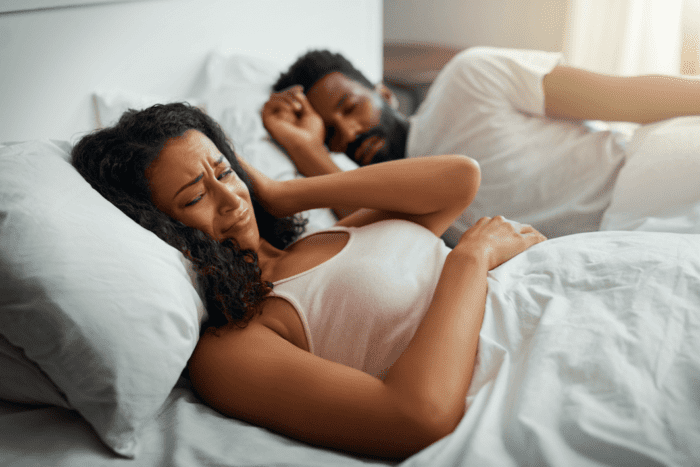If you snore, does it mean you have sleep apnea? While snoring is a sign of sleep apnea, it does not automatically mean that you have sleep apnea. Snoring occurs when air passes through the soft tissues of the mouth, narrowing the airway and creating vibrations. Sleep apnea occurs due to pauses in breathing during sleep from a blockage in the airway. We can help patients who experience snoring as a result of sleep apnea in Hampton Roads, VA. Here we will answer common questions about sleep apnea symptoms to help patients learn more about common symptoms and treatments.

Sleep Apnea FAQs
Are you unsure if you have sleep apnea? Discover more about sleep apnea with answers to these frequently asked questions:
What are the warning signs of sleep apnea?
Signs of sleep apnea can include:
- Insomnia
- Morning headaches and migraines
- Snoring
- Mood changes
- Difficulty concentrating during the day
- Waking up gasping and choking
- Episodes of pauses in breathing during sleep
If you notice these symptoms in yourself or your partner, it’s important to get professional care sooner than later. Sleep apnea can sometimes worsen over time.
What are the risk factors for sleep apnea?
There are several factors that can increase your risk of developing sleep apnea:
- Excess weight: Pharangyl fat can block the upper airway, and decreased lung capacity can affect sleep apnea.
- Age: Many sleep apnea patients are over 40.
- Sex: Males are more likely to develop sleep apnea.
- Alcohol Use: Alcohol is linked to snoring as well as slow and shallow breathing.
How serious is sleep apnea?
Sleep apnea symptoms can be moderate to severe. Patients who experience hundreds of instances of pauses in their breathing can be at risk of increased heart problems. Treating sleep apnea with an oral appliance, CPAP machine, and even weight loss can prevent complications and lower the risk of heart disease, stroke, or heart attacks.
Are there alternatives to a CPAP machine?
Patients with mild symptoms of sleep apnea can benefit from oral appliances, which are similar to mouthguards. Oral appliances shift the lower jaw forward to open up the airways. This alternative to the CPAP is noiseless and often more comfortable for some patients with sleep apnea.
Can sleep apnea go away on its own?
Sleep apnea cannot go away if patients do not get the proper treatment. In fact, sleep apnea is a chronic condition for many patients. Mitigating symptoms and making improvements in instances of sleep apnea can make living with this problem more manageable.
Do you suspect that you have sleep apnea? Are you looking for an alternative to a CPAP machine? Call Dr. William Harper for sleep apnea treatment today at 757.414.7227. You can also schedule a dental appointment with Dr. Harper online.

